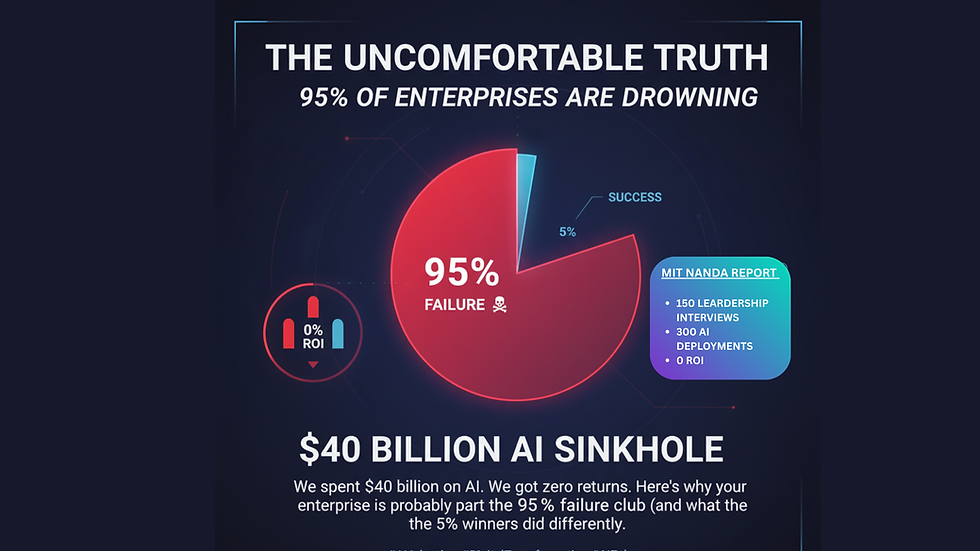Boosting ROI in Maintenance and Service: AI's Impact on New Hire Training Efficiency
- parminder singh
- Apr 17, 2024
- 3 min read
Updated: Jun 26
In the dynamic landscape of maintenance and service sectors, where every minute counts and efficiency is paramount, the time taken to train newcomers is a critical factor that significantly impacts the Return on Investment (ROI). Traditional training methods often consume substantial resources, both in terms of time and money, without guaranteeing optimal outcomes. However, the integration of Artificial Intelligence (AI) is revolutionizing this process, offering innovative solutions that not only streamline training but also enhance performance, ultimately boosting ROI.

The Cost of Traditional Training
Training newcomers in maintenance and service roles has historically been a labor-intensive process. Whether it's learning complex machinery operations or understanding intricate service protocols, traditional methods often involve extensive classroom sessions, shadowing experienced technicians, and hands-on practice. While these methods are valuable, they come with inherent challenges:
Time-Consuming: Onboarding new employees can take weeks or even months, delaying their productivity and stretching resources thin.
High Costs: Traditional training incurs significant expenses in terms of trainers' salaries, training materials, and the opportunity cost of diverting experienced staff from their core duties.
Variable Quality: The effectiveness of traditional training methods heavily relies on the expertise and availability of trainers, leading to inconsistencies in the quality of training received by newcomers.
Impact on ROI
The prolonged training period directly affects ROI in several ways:
Reduced Productivity: Newcomers are unable to perform at full capacity until they complete their training, leading to decreased efficiency and output during the initial phase of employment.
Increased Turnover: Lengthy training periods can frustrate employees, leading to disengagement and higher turnover rates, thereby increasing recruitment and training costs.
Missed Opportunities: Delays in onboarding can result in missed opportunities to capitalize on market demand or address urgent service requirements, potentially impacting revenue generation.
The American Society for Training and Development (ASTD) estimates that U.S. businesses spend approximately $1,208 per employee on training and development annually.
AI: Transforming Training and Enhancing ROI
AI is revolutionizing newcomer training in the maintenance and service sector by offering innovative solutions that optimize the learning process and enhance ROI. Utilizing MaintenanceGPT, AI-powered platforms access information instantly, including manuals, SOPs, error codes, parameters, and job aids. This ensures that trainees have access to comprehensive resources at their fingertips, reducing downtime and production losses associated with searching for information. Furthermore, it facilitates the merging of seasoned wisdom with fresh talent by safeguarding and transferring tribal knowledge. By creating personalized platforms for engineers to document their hacks and tricks, it ensures that valuable insights are preserved and shared efficiently, easing the learning curve for new technicians or senior technicians learning new products.
Continuous assessment and feedback mechanisms driven by AI algorithms monitor trainees' progress in real-time. By identifying areas where additional support or practice is needed, AI enables timely intervention by trainers, ensuring that any skill gaps are addressed promptly. This expedites the learning process and minimizes the time required to achieve proficiency. The approach enhances long-term knowledge retention, minimizing the need for repetitive training sessions and reducing the overall training duration, while ensuring language-friendliness and compliance with regulatory requirements such as Good Manufacturing Practices (GMP).
A study published in the International Journal of Human-Computer Studies found that AI-based adaptive learning systems can increase learning efficiency by up to 50%.
A report by PricewaterhouseCoopers (PwC) suggests that VR training can reduce training time by up to 40% while improving knowledge retention by 75%.
AI is transforming newcomer training in the maintenance and service sector by streamlining access to information, preserving and sharing tribal knowledge, enhancing hands-on learning experiences, providing personalized feedback, and optimizing knowledge retention. These advancements not only minimize the impact on production and reduce training time but also ensure compliance with regulatory standards, ultimately maximizing ROI.
Schedule a demo now to witness the transformative potential firsthand




Comments